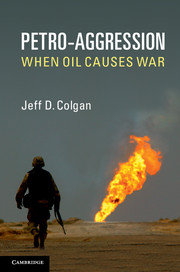Book contents
- Frontmatter
- Contents
- Figures
- Tables
- Acknowledgments
- 1 Introduction
- 2 A theory of oil, revolution, and conflict
- 3 Evidence and research design
- 4 Quantitative impact of oil and revolution on conflict
- 5 Iraq
- 6 Libya and the Arab Jamahiriyya
- 7 Iran
- 8 Venezuela and the Bolivarian Revolution
- 9 Saudi Arabia
- 10 Does oil cause revolution?
- 11 Conclusion and policy implications
- References
- Index
6 - Libya and the Arab Jamahiriyya
Published online by Cambridge University Press: 05 February 2013
- Frontmatter
- Contents
- Figures
- Tables
- Acknowledgments
- 1 Introduction
- 2 A theory of oil, revolution, and conflict
- 3 Evidence and research design
- 4 Quantitative impact of oil and revolution on conflict
- 5 Iraq
- 6 Libya and the Arab Jamahiriyya
- 7 Iran
- 8 Venezuela and the Bolivarian Revolution
- 9 Saudi Arabia
- 10 Does oil cause revolution?
- 11 Conclusion and policy implications
- References
- Index
Summary
There is no state with a democracy except Libya on the whole planet.
– Muammar QaddafiLibya’s short history since its independence in 1951 is a turbulent one. The former Italian colony was initially ruled by a monarch, King Idris, until he was overthrown by a young pan-Arab nationalist named Muammar Qaddafi in 1969. Qaddafi became the de facto ruler of Libya for over four decades, during which he transformed the country with a socialist revolution from above. Geopolitically, Libya moved away from the West and allied itself with the Soviet Union, then switched its orientation to reach a rapprochement with the West, only to become a pariah state once more in 2011. Libya is a fascinating, complex country. This chapter focuses on its history prior to Qaddafi’s fall in 2011, both to test my argument and to provide background for understanding contemporary events.
Libya was remarkably aggressive in its foreign policy. At the height of its revolutionary period, 1969–1991, Libya engaged in a multitude of international conflicts and violent struggles, while at the same time seeking pan-Arab unification and solidarity. It engaged in a series of overlapping and violent conflicts with Chad. It also had militarized disputes with Egypt and the United States, and deployed troops to fight against Tanzania in the war in Uganda. Libya supported a wide range of foreign insurgencies and rebel groups, from Abu Nidal to the Irish Republican Army to the Black Panthers. It sustained a nuclear weapons program for more than three decades before reversing course in 2003 as part of its reconciliation with the West. Perhaps most famously, it sponsored several acts of international terrorism in the 1980s, including the Lockerbie airline bombing. Few countries of Libya’s size have a history of such intense and violent international affairs.
- Type
- Chapter
- Information
- Petro-AggressionWhen Oil Causes War, pp. 123 - 151Publisher: Cambridge University PressPrint publication year: 2013

